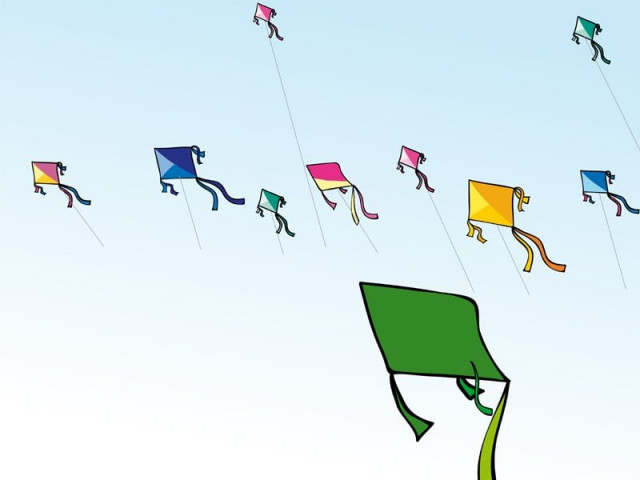Banning Basant: 70 % families had to stop sending their kids to school
Study finds out losses the Basant ban has led to, suggests measures to revitalise kite-making industry .

At least 53 per cent of the families made kites for 5 to 10 hours a day while the rest worked longer hours. ILLUSTRATION: MAHA HAIDER
Parveen Farooq of Jhang used to make 150 to 200 kites in 12 hours, with the help of her children. For every 100 kites they made, the family were paid between Rs30 and Rs35. But they were happy.
But in 2006, the government banned Basant and also promulgated the Prohibition of Kite Flying Ordinance 2006. The ordinance was re-promulgated in 2007 and in 2009, the Punjab Assembly passed the Punjab Prohibition of Kite Flying (Amendment) Act. The law prohibits kite flying, manufacturing, sale or offer to sell kites as well as kite string. Since then, many a petition, challenging the ban, has made its way to the court only to be denied even though the law allows the nazim concerned to allow kite flying and sale of kites for 15 days during spring in a year.

It’s been seven years since Farooq and her family have had it hard but they have no option but to follow the ban because of fear of “police raids and going to jail”, as Farooq put it. Under the law, violators can be imprisoned up to three years, fined Rs100,000 or both.
Muhammad Akram, a resident of Kot Lakhpat and father of four, has a similar story to tell. His wife used to make kites to support their family since he could not work because of a disability. After the ban, however, they have had a difficult time trying to make ends meet.
Akram and Farooq’s households are just two of the thousands of kite-makers’ families that were affected by the Basant ban and have been chronicled in a study conducted by HomeNet, an umbrella organisation that works on the conditions of home-based workers, particularly women.
The study is based on a survey and interviews and was conducted over a period of ----
The pilot study was conducted in two districts of the Punjab: Lahore and Jhang. The aim was to examine the effect of the ban on women kite-makers. About 90 per cent of the kite-makers were women, most of whom used to earn between Rs900 and Rs1,500 per month, according to the study. “Women, comprising the bulk of the industry,” states the study, “were more vulnerable as they had even scarcer opportunities of alternative employment.”

With the ban on kite-manufacturing, most of the kite-makers lost their livelihood because they did not have any other skills, it says.
Figures about the kite-making industry
In 2005, about 150,000 workers in Lahore were associated with the kite
manufacturing business
According to the study, after the ban more than 70 per cent of the families involved in the business had less food and had to stop sending their kids to school.
A majority of the kite-makers, 59 per cent, were between 20 and 30 years of age and 80 per cent of them were illiterate.
Around 62 per cent of kite-makers had been associated with the industry for between one and 10 years.
At least 53 per cent of the families made kites for 5 to 10 hours a day while the rest worked longer hours.
Around 67 per cent of the kite-makers still manufacture kites, but not as regularly as before. They earn between Rs500 and Rs2,000 rupees per week depending on how much work is available.
Most of the kites manufactured are sold in other provinces. However, 71 per cent of the respondents said it was difficult to gain access to new markets.
Recommendations in the report
Kite flying should be allowed in the light of the court orders and zones can be reserved where the sport could be enjoyed without any likelihood of damage or loss of human life
Regulation regarding kite flying cord in terms of its gauge, material, must be stringent and observed with the help of the kite-flying association and kite-making industry
There should be an alternative business or employment opportunities for women involved in kite-making until the government regularizes the kite-making industry
Kite-making industry should be geared up to export kites to USA, Europe, China and Middle East and the industry may be taxed for more revenue
Published in The Express Tribune, June 10th, 2013.



















COMMENTS
Comments are moderated and generally will be posted if they are on-topic and not abusive.
For more information, please see our Comments FAQ